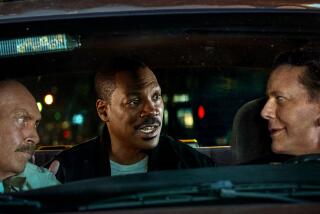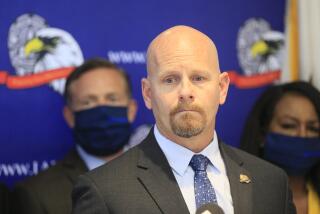A socialite dripping with police credentials sees his fantasy erode
- Share via
Arthur Kassel loves his badges.
For decades, the Beverly Hills socialite used his entertainment connections and political contributions to edge into law enforcement circles, gathering a collection of official credentials.
He hobnobbed with Los Angeles County Sheriff Lee Baca, used a state car to drive solo in carpool lanes and carried a Glock pistol on his hip.
In the world of cop groupies, the burly Brooklyn-born Kassel, 72, is the gold standard.
“Arthur lived in a Walter Mitty fantasy,” said his stepson, Willie Wilkerson III, referring to the hapless fictional character who fancied himself a pilot, a surgeon and a footloose killer.
The fantasy, however, has begun to erode after a government audit called into question Kassel’s use of taxpayer money. Kassel’s woes also have opened a window on the world of vanity cops — a place where who you know and how much you have to give can be the keys to earning a piece of tin.
“All politics is relationships,” said Baca, who welcomed Kassel into his inner circle of informal advisors and the department’s cadre of low-level reservists. “And Art knows all the governors.”
But Baca has acknowledged that there can be a downside to badge holders whose main function is generating money and support. The department has begun to rein them in after complaints about the use of official cars and other perks.
Friends and critics alike say Kassel, who declined to be interviewed for this article, is a throwback to that waning era of overt influence peddling.
“He’s got a heart of gold,” said Steve Michelson, a film producer who was Kassel’s business partner for a decade. “But he’s got unusual practices, and they don’t quite rub right with everybody.”
::
Kassel stands at the nexus of cops and Hollywood. He is guns and glitter.
As far back as the 1970s, longtime friend Stephen Solomon said, “if there was a fallen officer, Arthur would be on the phone to me and everyone he knew to raise money for the family.”
Kassel’s entree into the world of the rich and famous was bolstered by his late wife, longtime Hollywood Reporter publisher Tichi Wilkerson Kassel, who introduced him to many of the celebrities he sought out to headline galas for police and military veterans.
It was thanks to a concert by Latin crooner Julio Iglesias that Kassel began a decade of fundraising for the Eagle & Badge Foundation, the charity of the Los Angeles Police Protective League.
The foundation “was Arthur’s baby,” said onetime league president Ted Hunt, who joined with Kassel and L.A. Councilman Dennis Zine, a former LAPD sergeant, to found the nonprofit in 2001.
Kassel had come west in 1973 to work as an assistant to Los Angeles Mayor Sam Yorty. He later found work as a bodyguard to Tichi Wilkerson, who had inherited the Hollywood Reporter from her husband in 1962 and quickly rose to become one of the most powerful women in Hollywood.
She and Kassel wed in 1983. Poised and sophisticated, Tichi retained muralists to adorn their Beverly Hills home with Kassel’s likeness. Brash with most, he was her gentle watchdog.
Kassel launched the Beverly Hills Gun Club in 1981 — Sylvester Stallone was a partner — providing training to wealthy gun owners. The club dissolved in bankruptcy. With Tichi’s help, he ran a video and publishing company. That too went under.
Glad-handing came more naturally. A photo of Kassel with President Lyndon B. Johnson adorns a “wall of fame” that covers his home office.
The first of many state appointments came in 1977 from Gov. Jerry Brown, who named him to the Narcotic Addict Evaluation Authority and became a frequent guest at the Kassel mansion. Gov. Pete Wilson appointed Kassel to the State Compensation Insurance Fund board in 1994.
“I never ever heard Arthur talk about making money or getting paid,” said former Gov. Gray Davis, who long has included Kassel as a Thanksgiving dinner guest. “He really does believe in helping his fellow human beings.”
He networked feverishly. Deeply tanned, Kassel drove a Rolls-Royce with a front-seat fax machine and strapped three cellphones to his belt next to his beloved Glock.
Kassel’s contributions to state and federal officials on both sides of the aisle topped hundreds of thousands of dollars. It wasn’t hard for him to parlay his connections into law enforcement credentials.
A Bureau of Alcohol, Tobacco and Firearms honorary credential came in 1986 — in gratitude for a fundraiser featuring Stallone that Kassel orchestrated for the National Law Enforcement Officers Memorial in Washington, D.C., said then-ATF Director Stephen Higgins.
Three years later, Kassel sought an audience with Sam Cicchino, the interim head of the U.S. Marshals Service in Los Angeles.
Then vice president of the volunteer U.S. Marshals Assn., Kassel “dropped his wife’s name” and pressed for a special deputy marshal’s badge in exchange for a gala to celebrate the agency’s bicentennial, Cicchino recalled.
“I explained to him that we don’t do that,” said Cicchino, who eventually signed off on a lesser credential: a government-issued ID card.
::
Kassel’s biggest coup came in 1998 when, at the urging of Wilson’s office, he was named “special assistant” to then-Department of Mental Health Director Stephen W. Mayberg.
Kassel would supervise no one, but Mayberg said he allowed him the “working title” of chief of law enforcement services on the condition that he complete minimal training. Kassel did so and was made a Level III reservist — the lowest under state law, allowing holders to perform “limited support duties” while supervised.
That status allowed him to accrue reservist badges, including from the Orange County and L.A. County sheriff’s departments and the Culver City Police Department.
In his state job, Kassel carried a business card with a law enforcement star and drove a state car outfitted with police lights, radio antennas and a gun safe in the trunk.
At first, he helped with hospital security audits and served as a Homeland Security liaison, said Mayberg, who retired in 2010. Mayberg then shifted Kassel to community work, where he networked with top cops and carved a role for the department in homeless and veteran projects, securing $4 million for expansion of the Salvation Army’s Bell shelter.
Hospital police officials, however, were outraged.
“He knew nothing about security in a custodial setting,” said former Atascadero State Hospital Chief Larry Holt, who said Kassel rarely showed up at the psychiatric facility. When he did, it was to foot the lunch bill and show off pictures of starlets.
Kassel’s tricked-out vehicle didn’t help, particularly when tickets arrived at San Bernardino’s Patton State Hospital showing Kassel cruising solo in the carpool lane and running red lights. Mayberg said Kassel never sought reimbursements for expenses and repaid the state for his tickets.
Auditors later examined one of Kassel’s 13 years as Mayberg’s assistant — 2009 — determining that he had spent two-thirds of his time hobnobbing with celebrities and elected officials and had improperly billed taxpayers. Among the events Kassel attended on the state dime, the audit noted: Eagle & Badge gala planning meetings, golf tournaments and a concert by Iglesias.
Kassel left state service in May 2011, having earned more than $1 million stretching back to 1977.
The audit was released that August, just weeks before Kassel’s Eagle & Badge gala.
At the event, Rep. Dana Rohrabacher (R-Huntington Beach) played a “freedom song” on the guitar as the event’s honorary chairmen — L.A. Mayor Antonio Villaraigosa and Police Chief Charlie Beck — looked on. Then came the “In the Line of Duty” awards, bestowed on film stars Warren Beatty and Annette Bening for their commitment to men and women in uniform.
Like all the other fundraisers Kassel hosted for the nonprofit, there was a twist: It also raised money for the Tichi Wilkerson Kassel Movement Therapy Foundation, a nonprofit Kassel originally founded to raise money for Parkinson’s after his wife’s diagnosis.
The arrangement called for a 50-50 split of gala proceeds with Kassel’s organization, Hunt and others said.
A review of Eagle & Badge tax records from 2001 through 2010 showed that at most $581,000 — 29% of the nearly $2 million raised — has gone toward the organization’s mission of helping needy LAPD families and related community causes.
The records do not indicate whether money given to Kassel’s foundation is included in that total. Even if it is not, representatives of two national organizations that specialize in nonprofit governance said about 75% of a well-run nonprofit’s revenues should go to its programs.
Now the long-standing arrangement has come to an end.
Last year, the Los Angeles Police Protective League informed Kassel that he would no longer play a role in the gala, which took place Oct. 6. This year, Kassel was stripped of his presidency, although he remains on the Eagle & Badge board.
L.A. County’s Sheriff Baca said he has counseled his friend that his credential collection erodes his credibility.
Baca, a 47-year veteran of real policing, told him: “Get rid of all those badges, you’ll be a freer man.”
More to Read
Sign up for Essential California
The most important California stories and recommendations in your inbox every morning.
You may occasionally receive promotional content from the Los Angeles Times.













